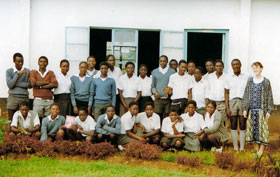  |
| HOME | THIS ISSUE | CALENDAR | GRANTS | BACK ISSUES | < BACK | NEXT > |
Peace Corps recruiting volunteers from UConn to work overseasby Karen Singer - February 21, 2006 |
||||
|
Forty-five years after its founding, the Peace Corps is surviving – and thriving. On Feb. 28, a recruiter will be on the Storrs campus seeking volunteers from UConn to swell the ranks. With federal funding up, and a 30-year high in enrollment, the organization appears as relevant today as it was in 1961, when President John F. Kennedy established it to promote world peace and friendship. Since then, 248 UConn graduates have been in the Peace Corps, and five are presently serving. Andrew Burtless, a returned Peace Corps volunteer-turned-recruiter, hopes to find some new volunteers. “UConn is great for us because it has a big agriculture school where we can find people for our scarce skills, like animal husbandry, crop extension, and agribusiness,” says Burtless, who visits Storrs twice a year. “But chances are there’s a degree that relates to every one of our assignments.” Nowadays there are more opportunities than ever, in areas such as information technology training, business development, and AIDS awareness. “The need for volunteers has never been greater,” Burtless says. “The perceptions of who we are as Americans and what we stand for are changing rapidly… and we want to send a good message to people about Americans.” The reasons people give for applying to the Peace Corps are as varied as the volunteers themselves. “Their motivation ranges from wanting to get a foot in the door for pursuing a career with the government … to gaining international experience, obtaining relevant work/leadership experience or proficiency in another language, obtaining a post-graduate degree, wanting to improve the quality of life for the less fortunate, or simply wanting to experience something radically different from what they have grown accustomed to here at home,” Burtless says. The application process can take as long as a year, and requires references, an interview, and medical clearance. Recruiters look for people who are self-starters – highly motivated and flexible. “You’re going to be working overseas, unsupervised and without the resources we would provide here,” Burtless says. Volunteers sign up for a two-year term and are given choices, but not the final say, in where they are sent. But Burtless says no one goes to places where there is an “ongoing conflict.” The experience is often life-altering.
So it was for Teresa Foley, who became a Peace Corps volunteer right after graduating from UConn in 1987 with a bachelor’s in finance, and switched careers as a result. “I enjoyed traveling and wasn’t ready to go to work in the business world,” Foley says. Instead, she went to Kenya for two years, where she taught high school math. The students hadn’t had a teacher in a couple of years, and needed a lot of help preparing for a national test. She also did community relations work, trying to dispel misconceptions about the U.S. Many of her students thought American streets “are paved with gold and everyone has a gun.” In addition, Foley set up a school library containing donated American textbooks and reference books. Returning to the U.S., Foley went to graduate school at the University of Ohio, receiving a master’s degree in curriculum and instruction in 1993. A decade later, in 2003, she earned a Ph.D. in special education at UConn. Foley now lives in Manchester, Conn., and is an educational consultant, often working with school districts on issues involving adult learners with disabilities. She says she will never forget her time in Kenya. In 1994, she spent five months there training teachers entering the Peace Corps as volunteers, and another month visiting friends and former students in the village where she had lived. Though there’s more competition now for volunteers from newer groups such as AmeriCorps., Burtless says the Peace Corps’ longevity gives it an edge over the others. “Peace Corps has an established record of accomplishment and enjoys a great reputation in all corners of the globe,” he says. “Few other international volunteer organizations have the sheer resources that a $322 million annual budget can bring, such as full medical coverage, and three months of language, technical, and cross-cultural training before service.” On Feb. 28, Burtless will be at the Human Services/Nonprofit Career Fair at Bishop Center between 1 and 4 p.m. He will also host a Peace Corps general information meeting at the Homer Babbidge Library between 6 and 7 p.m. the same day. |
| ADVANCE HOME UCONN HOME |

